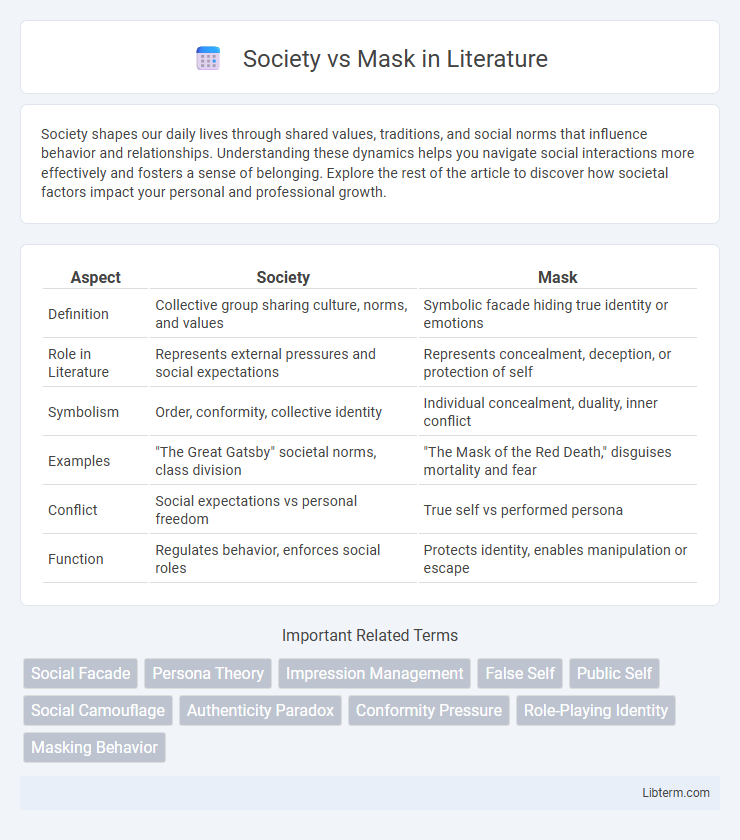Society shapes our daily lives through shared values, traditions, and social norms that influence behavior and relationships. Understanding these dynamics helps you navigate social interactions more effectively and fosters a sense of belonging. Explore the rest of the article to discover how societal factors impact your personal and professional growth.
Table of Comparison
| Aspect | Society | Mask |
|---|---|---|
| Definition | Collective group sharing culture, norms, and values | Symbolic facade hiding true identity or emotions |
| Role in Literature | Represents external pressures and social expectations | Represents concealment, deception, or protection of self |
| Symbolism | Order, conformity, collective identity | Individual concealment, duality, inner conflict |
| Examples | "The Great Gatsby" societal norms, class division | "The Mask of the Red Death," disguises mortality and fear |
| Conflict | Social expectations vs personal freedom | True self vs performed persona |
| Function | Regulates behavior, enforces social roles | Protects identity, enables manipulation or escape |
Understanding the Concept of Masks in Society
Masks in society function as symbolic representations of identity, shaping social interactions and personal behavior. They enable individuals to navigate societal expectations by concealing true emotions or intentions, facilitating conformity or protection in various social contexts. Understanding this concept reveals the psychological and cultural significance masks hold in maintaining social order and managing interpersonal dynamics.
Historical Context: Masks Through the Ages
Masks have played a crucial role throughout history, serving cultural, religious, and social functions from ancient tribal rituals to theatrical performances in Greek and Roman civilizations. In medieval Europe, masks symbolized mystery and transformation during festivals like Carnival, while in many African and Native American cultures, they connected communities with spiritual realms. The evolution of mask usage reflects societal values and power structures, revealing how human identity and social roles have been continuously negotiated and performed across time.
The Psychological Impact of Social Masking
Social masking, the practice of concealing one's true emotions to conform to societal expectations, significantly influences psychological well-being, often leading to increased stress, anxiety, and identity confusion. Research indicates that prolonged social masking correlates with heightened levels of depression and reduced self-esteem due to the dissonance between authentic self and public persona. Understanding the psychological impact of social masking is essential for developing supportive mental health interventions that promote genuine self-expression and resilience.
Societal Expectations and the Need for Masks
Societal expectations often compel individuals to wear metaphorical masks to conform to social norms and avoid judgment. These masks serve as protective barriers, concealing true emotions and identities to maintain harmony within social structures. The necessity for masks highlights the tension between authentic self-expression and the pressure to meet collective standards.
Authenticity vs. Conformity: A Cultural Dilemma
Society often pressures individuals to wear metaphorical masks to conform to cultural norms, sacrificing authenticity for acceptance. This cultural dilemma highlights the tension between expressing true identity and adhering to societal expectations. Navigating this balance impacts mental health, social relationships, and personal fulfillment.
Social Media and the Digital Mask
Social media platforms often encourage users to construct digital masks that highlight curated aspects of their identities, fostering superficial connections rather than authentic interactions. This digital facade shapes societal perceptions by amplifying idealized selves, which can distort reality and influence mental health negatively. The tension between genuine self-expression and the pressures of online personas underscores a critical challenge in navigating modern social dynamics.
The Role of Masks in Relationships and Communication
Masks influence relationships by shaping how individuals express emotions and perceive authenticity during interactions. Psychological studies indicate that wearing masks can create barriers to nonverbal communication, often leading to misunderstandings or reduced emotional connection. However, masks can also serve as symbolic tools, allowing individuals to explore different aspects of their identity and manage social impressions strategically.
Breaking Free: Embracing Vulnerability in Society
Society often imposes rigid masks to conform to social norms, creating barriers to authentic self-expression and emotional connection. Breaking free from these masks requires embracing vulnerability, which fosters genuine relationships and promotes mental well-being. Research indicates that vulnerability enhances empathy and trust, leading to stronger social bonds and personal growth.
The Consequences of Permanent Masking
Permanent masking can lead to psychological consequences such as increased social anxiety and a diminished sense of identity, as individuals may feel disconnected from their authentic selves. Long-term mask usage affects interpersonal communication by obscuring facial expressions, reducing emotional recognition and empathy in social interactions. Societal reliance on masks can also foster a culture of mistrust, where genuine social cues are masked, impacting community cohesion and mental health.
Towards a More Authentic Society
Society often encourages conformity through masks that hide true identities, creating barriers to genuine connection and self-expression. Embracing authenticity fosters trust, emotional well-being, and inclusive communities where individuals feel valued for their true selves. Cultivating environments that prioritize transparency and vulnerability leads to a more authentic society grounded in mutual respect and understanding.
Society Infographic

 libterm.com
libterm.com